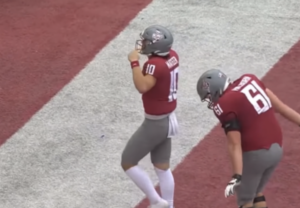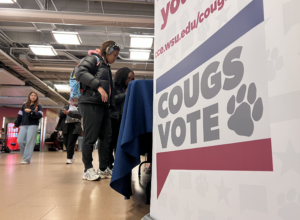
Now bowl eligible, Cougs hang onto narrow path to CFP
More Murrow News Stories PULLMAN, Wash — Washington State University football is bowl-bound after their latest win, moving them to an impressive 6-1 record. Now this guarantees WSU a spot



PULLMAN, Wash. — Sam, a 20-year-old, hoped her struggle with anorexia and bulimia might be behind her. Then the coronavirus hit.
“It was really depressing coming home for me,” said Sam, who moved back home with her parents in Petaluma, California while attending virtual classes at Washington State University last fall. “I just have kind of bad memories here. Home can be really triggering for me, because that’s where everything started. Like my house, in my kitchen, in my old bathroom, stuff like that.”
Experts say people who suffer from eating disorders face a specific set of challenges during the pandemic, including the increase or decrease of access to food, a lack of access to health care professionals, and increased use of social media that can increase preoccupation with weight. A 2020 survey in the International Journal of Eating Disorders revealed wide-ranging effects of the pandemic on eating disorders, including increased binge-eating and anxiety.
“It’s gotten absolutely worse,” said Kelsey Ford, the outreach manager for the Emily Program, a national eating disorder treatment center. “The isolation of quarantine has caused a breakdown in routine, a sudden lack of structure, and fractured support systems.”
Unfortunately, Ford said, eating disorders thrive in these types of environments. Ford, who has worked with the Emily Program for over a decade, said the number of people who are seeking help for an eating disorder has increased dramatically.
College students appear to be a particularly high risk. Elizabeth Murray, a Cougar Health Services peer health educator, said that eating disorders typically develop between ages 18-21. That’s a time in life where young people meet many different people, which leads to ample opportunity for comparison.
Murray said that social media has made comparison to one another easier than ever before, and it has a greater effect on the younger generation growing up in a digital space.
“We are constantly bombarded by pictures of people who are thinner or more athletic than us,” Murray said. “We eternalize the need to conform to the current appearance ‘ideal,’ when it’s just not realistic.”
Disordered eating habits have been normalized and even romanticized in the current social media culture, according to Ford.
“Human beings have a way of minimizing their own struggles,” said Ford. “But if you are spending a lot of time preoccupied with your weight or food—that’s not normal. And you can and should get help for those thoughts.”
Sam said she was doing well with her disorder and eating regularly during college. But after she came home, she became depressed, anxious, and wasn’t eating enough.
“I wasn’t meeting with my nutritionist and my therapist when Covid hit, when we usually meet weekly,” she said. “I had to really self-reflect and be accountable to keep myself from slipping into old habits. And with Covid going on, you can’t really go hang out with your friends to distract yourself.”
As Sam’s mental health worsened, so did her academic work. She dropped out of college last fall because she fell behind in classes and decided to focus on her health. Once some facilities opened again and she was able to reach her care team, her dietician reassured her that it was okay to take some time off of school to focus on treating her eating disorder and developing more of a routine.
“People can be so ashamed about it and want to hide it so much,” she said. “You have to advocate for yourself. If you don’t speak up about what’s going on in your head, it lets the eating disorder win. And then you’re really just losing out on good things in life.”

More Murrow News Stories PULLMAN, Wash — Washington State University football is bowl-bound after their latest win, moving them to an impressive 6-1 record. Now this guarantees WSU a spot

More Murrow News Stories PULLMAN (Murrow News 8) – With many students experiencing food insecurity, Washington State University’s food pantry, located on the first floor of the Compton Union Building






Note: Murrow News is produced by students of the Edward R. Murrow College of Communication at Washington State University. Northwest Public Broadcasting proudly supports the work produced by these young journalists.
If you have any issues/concerns please feel free to reach out to Instructor, Matt Loveless or Department Chair, Ben Shors.
©2020 Washington State University Board of Regents – Edward R. Murrow College of Communication.






